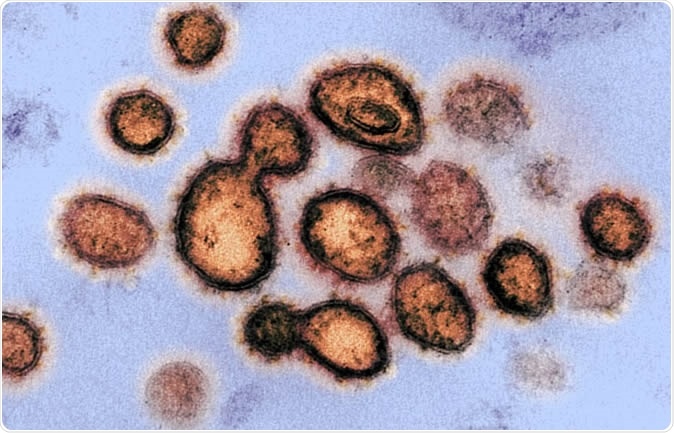Since the emergence of the coronavirus disease (COVID-19) in China in December 2019, health experts have cautioned that the disease is particularly serious in high-risk populations, including older adults, those with underlying diseases, and those who are immunocompromised. Now, doctors in the United Kingdom warn of a rare and severe inflammatory disease in children with COVID-19.
In recent weeks, a small number of children have been admitted to pediatric intensive care units for a severe immune reaction. Doctors from the Pediatric Intensive Care Society have cautioned about a rare inflammatory disease seen in children in North London and other parts of the United Kingdom. The team released an urgent alert due to the rise in cases of children with issues consistent with severe COVID-19.

Novel Coronavirus SARS-CoV-2 - This transmission electron microscope image shows SARS-CoV-2, the virus that causes COVID-19, isolated from a patient in the U.S. Virus particles are shown emerging from the surface of cells cultured in the lab. The spikes on the outer edge of the virus particles give coronaviruses their name, crown-like. Image captured and colorized at NIAID's Rocky Mountain Laboratories (RML) in Hamilton, Montana. Credit: NIAID
What is a multi-system inflammatory state?
A multi-system inflammatory state is a severe immune response that can impact the body in many ways, mainly by making the blood vessels leaky. As a result, the child suffers from low blood pressure, and a build-up of fluid in the lungs and other organs. The condition is life-threatening, with patients requiring intensive care to support the lungs, heart, and other organs, such as the kidneys.
The Pediatric Intensive Care Society UK (PICS) announced the urgent alert from the National Health Service England due to cases of children presenting with overlapping features of toxic shock syndrome and atypical Kawasaki disease with blood parameters. Some of these children tested positive for COVID-19.
Toxic shock syndrome is a life-threatening disease that is caused by the presence of toxins from bacteria or pathogens. Meanwhile, Kawasaki disease is a childhood condition that causes inflammation in the walls of the blood vessels, which can damage the heart if it is left untreated.
Italy and Spain have also reported similar cases, while doctors at Stanford University recently reported the case of a 6-month-old infant who was diagnosed with Kawasaki disease and COVID-19.
Is it related to COVID-19?
Doctors are not sure if these cases are tied to COVID-19. Though some of the patients tested positive for the coronavirus, others had no COVID-19. It may be a rare coronavirus-related inflammatory syndrome, or another pathogen can cause it.
The NHS issued the warning for general practitioners to be aware of the spiking cases so they can assess and manage children appropriately.
“If you are a healthcare professional and see children presenting with a picture of toxic shock or atypical Kawasaki Disease then please discuss this case early with a pediatric infectious disease or pediatric critical care teams via your usual pathways (often pediatric retrieval services),” the warning states.
What are the manifestations?
The most common signs and symptoms are seen in these children included fever, skin rashes, and severe abdominal pain, along with markers of severe inflammation in the blood. Some of the children required treatment for heart inflammation. However, the inflammatory syndrome appears to be rare, with just a dozen children in the country.
The report also included blood parameters consistent with severe COVID-19. The children with the rare inflammatory disease exhibited high C-reactive protein (CRP), a high erythrocyte sedimentation rate (ESR), and high ferritin, which are all blood markers for inflammation.
In adults with COVID-19, some experience a cytokine storm syndrome or hyper inflammation, as well as hemophagocytic lymphohistiocytosis (HLH) and macrophage activation syndrome (MAS).
Some of the children also manifested cardiac inflammation, which is known as myocarditis. The coronary arteries of some children appeared like those seen in Kawasaki Disease.
“PICS will continue to work with PICAnet and other national organizations to collect accurate data relating to critically ill children presenting to hospital with suspected COVID-19 disease,” the warning added.
The doctors also urged parents not to panic, saying that toxic shock syndrome and Kawasaki disease are very rare conditions. Parents should observe their children for signs of the conditions, which include fever, a skin rash that does not change when pressed, and breathing problems. Children manifesting these symptoms should immediately seek medical attention.
Kawasaki disease is often seen in Asian countries, as its name originated in Japan. Also called Kawasaki syndrome, is a febrile illness of unknown cause. It usually affects children younger than five years old. It was first described in Japan by Tomisaku Kawasaki in 1967. The first case of the disease outside of Japan was reported in Hawaii in 1976.